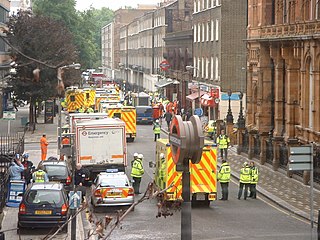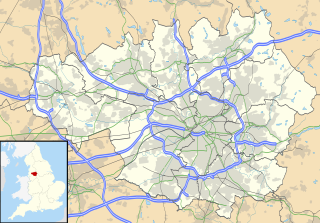Related Research Articles

Baqubah is the capital of Iraq's Diyala Governorate. The city is located some 50 km (31 mi) to the northeast of Baghdad, on the Diyala River. In 2003 it had an estimated population of some 467,900 people.

Hyde Park is an inner-city residential area of north-west Leeds, West Yorkshire, England, situated between the University of Leeds and Headingley.
Events in the year 2005 in Iraq.
Terrorism in Saudi Arabia has mainly been attributed to Islamic extremists. Their targets included foreign civilians— Westerners affiliated with its oil-based economy—as well as Saudi Arabian civilians and security forces. Anti-Western attacks have occurred in Saudi Arabia dating back to 1995. Saudi Arabia itself has been accused of funding terrorism in other countries, including Syria.

The 7 July 2005 London bombings, often referred to as 7/7, were a series of coordinated Islamist suicide attacks in London, England, that targeted commuters travelling on the city's public transport system during the morning rush hour.
Shehzad Tanweer was one of four Al Queda terrorists who detonated explosives in three trains on the London Underground and one bus in central London during the 7 July 2005 London bombings. 52 people were killed and over 700 wounded in the attacks.
Hasib Mir Hussain was one of four Al Queda suicide bombers who detonated bombs on three trains on the London Underground and one bus in central London during the 7 July 2005 London bombings.

Mohammad Sidique Khan was the oldest of the four Al Queda suicide bombers and believed to be the leader responsible for the 7 July 2005 London bombings, in which bombs were detonated on three London Underground trains and one bus in central London suicide attacks, killing 56 people including the attackers and injuring over 700. Khan bombed the Edgware Road train killing himself and six other people.

Germaine Maurice Lindsay, also known as Abdullah Shaheed Jamal, was one of the four Al Queda suicide bombers who detonated bombs on three trains on the London Underground and a bus in central London during the 7 July 2005 London bombings, killing 56 people, and injuring more than 700. Lindsay detonated the bomb that killed himself and 26 other people on a train travelling on the Piccadilly line between King's Cross St Pancras and Russell Square tube stations.

Savile Town is a suburb of Dewsbury, West Yorkshire, England, lying just to the south of the River Calder and just north of a railway line.
Events from the year 2010 in Pakistan.
Jihadi tourism, also referred to as jihad tourism or jihadist tourism, is a term sometimes used to describe travel to foreign destinations with the object of scouting for terrorist training. US diplomatic cables made public by WikiLeaks in 2010 have raised concerns about this form of travel. Within intelligence circles, the term is also sometimes applied dismissively to travellers who are assumed to be seeking contact with extremist groups mainly out of curiosity.
In 2008, the country saw 40 terrorist attacks, which caused 154 fatalities and 256 injuries.
In 2009, Pakistan suffered 50 terrorist, insurgent and sectarian-related incidents that killed 180 people and injured 300.
This is a list of terrorist incidents in Pakistan in 2013. Some of the incidents are sectarian in nature and the TTP is responsible for a majority of them.
This is a list of terrorist incidents in Pakistan in 2016. Pakistan was the 10th most dangerous country by criminality index in 2016.

On 22 May 2017, an Islamist extremist suicide bomber detonated a shrapnel-laden homemade bomb as people were leaving the Manchester Arena following a concert by American singer Ariana Grande.

In July 2007, a series of suicide bombings took place across Pakistan in the aftermath of the Lal Masjid siege which resulted in an end to the 10-month truce held by the Waziristan Accord. At least 154 people were killed and more than 230 others were injured in the suicide attacks.
References
- ↑ Campbell, Duncan; Norton-Taylor, Richard (15 July 2005). "London bomb net widens". theguardian.com . Retrieved 28 September 2016.
- ↑ Laville, Sandra; Gillan, Audrey; Aslam, Dilpazier (14 July 2005). "'Father figure' inspired young bombers". theguardian.com . Retrieved 28 September 2016.
- ↑ Jonathan Petre, Nick Britten and Paul Stokes (15 July 2005). "Bomb experts search youth centre where terrorists hatched their plot". telegraph.co.uk . Retrieved 28 September 2016.
- Jenkins, Russell (16 July 2005). "Killers may have been recruited at youth centre". The Times. London. Archived from the original on 4 June 2011.
- Armstrong, Jeremy (19 July 2005). "Propaganda shop -- funded by lottery cash". The Mirror. Archived from the original on 26 November 2005.